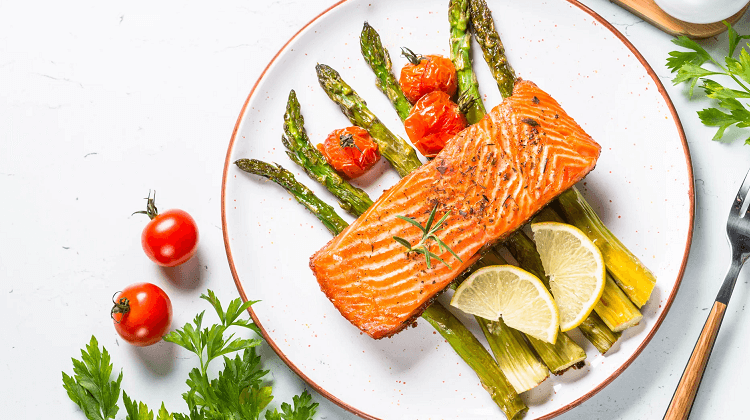In recent years, the ketogenic (keto) and low-carb diets have gained immense popularity for their effectiveness in weight loss, improving metabolic health, and enhancing mental clarity.
These diets focus on reducing carbohydrate intake and increasing healthy fats, driving the body into a state of ketosis, where it burns fat for energy instead of glucose.
This comprehensive guide will delve into the principles, benefits, and potential challenges of the keto and low-carb diets, providing you with the knowledge to make informed dietary choices.
Understanding the Keto and Low-Carb Diets
The Ketogenic Diet:
The keto diet is a high-fat, moderate-protein, and very low-carb eating plan.
The primary goal is to induce ketosis, a metabolic state where the body burns fat for fuel instead of carbohydrates.
Typically, the macronutrient ratio for a keto diet is around 70-75% fat, 20-25% protein, and 5-10% carbohydrates.
This dramatic shift in macronutrient intake forces the body to utilize fat as its primary energy source, producing ketones in the liver, which are then used for energy.
The Low-Carb Diet:
A low-carb diet reduces carbohydrate intake, but does not necessarily aim to achieve ketosis. It focuses on controlling blood sugar levels and improving insulin sensitivity.
Carbohydrate intake varies, but usually falls between 50-150 grams per day, with the remaining calories coming from fats and proteins.
This diet can still promote weight loss and improved metabolic health without the strict carb restrictions of the keto diet.

Benefits of the Keto and Low-Carb Diets:
#1. Weight Loss:
Both diets are effective for weight loss. By reducing carbohydrate intake, the body lowers insulin levels, allowing for increased fat burning and reduced fat storage.
Keto diets, in particular, can lead to rapid weight loss initially due to water loss and a shift to fat metabolism. Over time, this can result in significant fat loss, especially when combined with regular physical activity.
#2. Improved Blood Sugar Control:
Reducing carbs can significantly improve blood sugar control and insulin sensitivity, making these diets beneficial for people with type 2 diabetes or insulin resistance.
By stabilizing blood sugar levels, individuals can prevent the spikes and crashes that often lead to cravings and overeating. This can help with long-term weight management and overall metabolic health.
#3. Enhanced Mental Clarity:
Many people report improved mental clarity and focus on keto and low-carb diets. Ketones, produced during ketosis, are an efficient fuel source for the brain.
This can lead to enhanced cognitive function, better concentration, and even mood stabilization.
The steady energy supply from fats and ketones can prevent the brain fog and energy dips associated with high-carb diets.
#4. Increased Energy Levels:
By stabilizing blood sugar levels and relying on fat for fuel, individuals often experience sustained energy levels throughout the day.
Without the energy dips caused by high-carb meals, people on these diets often feel more energetic and alert. This can improve overall productivity, physical performance, and quality of life.
Key Foods to include in your Keto or Low-Carb Diet
Healthy Fats:
- Avocados: Rich in monounsaturated fats and fiber, avocados are a great addition to any meal.
- Nuts and seeds: Almonds, chia seeds, flaxseeds, and walnuts provide healthy fats, protein, and essential nutrients.
- Olive oil: A staple in the Mediterranean diet, olive oil is rich in antioxidants and healthy fats.
- Coconut oil: Contains medium-chain triglycerides (MCTs), which can boost ketone production.
- Fatty fish: Salmon, mackerel, and sardines are excellent sources of omega-3 fatty acids and high-quality protein.
Protein Sources:
- Grass-fed beef: Higher in omega-3 fatty acids and antioxidants compared to conventional beef.
- Poultry: Chicken and turkey are lean protein sources that can be easily incorporated into meals.
- Eggs: A versatile and nutrient-dense food rich in protein and healthy fats.
- Tofu and tempeh: Plant-based protein options suitable for vegetarians and vegans.
- Full-fat dairy: Cheese, yogurt, and butter provide fats and proteins essential for a keto diet.
Low-Carb Vegetables:
- Leafy greens: Spinach, kale, and Swiss chard are low in carbs and high in vitamins and minerals.
- Cruciferous vegetables: Broccoli, cauliflower, and Brussels sprouts are fiber-rich and nutrient-dense.
- Zucchini: A versatile vegetable that can be used in various dishes, from noodles to baked goods.
- Bell peppers: Low in carbs and high in vitamins A and C.
- Asparagus: A low-carb vegetable high in fiber, folate, and vitamins A, C, and K.
Foods to Avoid while on a Keto or Low-Carb Diet
- Sugary foods and drinks: Soda, candy, and desserts should be avoided due to their high sugar content.
- Grains and starches: Bread, pasta, rice, and other grain-based foods are high in carbs.
- High-carb fruits: Bananas, grapes, and mangoes contain more sugars than berries or melons.
- Processed foods and snacks: Chips, crackers, and packaged snacks often contain hidden carbs and unhealthy fats.

Potential Keto and Low-Carb Diet Challenges and Possible Solutions
#1. Keto Flu:
As the body adjusts to ketosis, some individuals may experience flu-like symptoms, including headaches, fatigue, and irritability. This is often referred to as the “keto flu.”
Staying hydrated, replenishing electrolytes (sodium, potassium, magnesium), and gradually reducing carbs can help mitigate these symptoms. It’s also important to get plenty of rest and give your body time to adapt to this new metabolic state.
Consider drinking bone broth or electrolyte supplements to ease the transition.
#2. Social Situations:
Eating out or attending social events can be challenging on a keto or low-carb diet.
Plan ahead by researching restaurant menus for keto-friendly options, bringing keto-friendly snacks, or eating a small meal beforehand to avoid temptation.
Communicate your dietary needs to friends and family to gain their support and understanding.
Many restaurants now offer low-carb and keto options, so don’t hesitate to ask for modifications.
#3. Nutrient Deficiencies:
A restrictive diet can lead to nutrient deficiencies if not carefully planned.
Focus on consuming a variety of nutrient-dense foods and consider taking supplements like magnesium, potassium, and omega-3 fatty acids if needed.
Incorporate a range of vegetables, nuts, seeds, and high-quality protein sources to ensure you are getting a balanced intake of essential vitamins and minerals.
Regularly monitor your nutrient levels through blood tests and adjust your diet accordingly.
Sample Keto and Low-Carb Diet Meal Plan
Breakfast:
- Keto: Scrambled eggs with avocado and bacon.
- Low-Carb: Greek yogurt with berries and nuts.
Lunch:
- Keto: Grilled chicken salad with olive oil dressing.
- Low-Carb: Turkey lettuce wraps with cheese and mustard.
Dinner:
- Keto: Baked salmon with roasted broccoli.
- Low-Carb: Stir-fried tofu with mixed vegetables.
Snacks:
- Keto: Cheese sticks, olives.
- Low-Carb: Almonds, cucumber slices with hummus.
Embarking on a keto or low-carb diet can transform your health and well-being. Start by educating yourself, planning your meals, and gradually adjusting your eating habits.
Join online communities, follow reputable sources, and consult with a healthcare professional or qualified fitness coach to ensure you are making the best choices for your body.
Take the first step today towards a healthier, more energetic life. Track your progress, stay motivated, and celebrate your achievements along the way.

Conclusion
The ketogenic and low-carb diets offer a range of benefits, from weight loss to improved metabolic health and mental clarity.
While these diets require commitment and careful planning, the potential rewards are significant.
By understanding the principles, benefits, and challenges, you can make informed decisions and embark on a successful journey toward better health and fitness.
Remember, consistency and patience are key to achieving lasting results. Stay motivated, listen to your body, and enjoy the journey to a healthier you.
With the right approach, the keto or low-carb diet can be a sustainable and effective way to achieve your health and fitness goals.
Embrace the changes, stay flexible, and adapt your diet as needed to suit your lifestyle and preferences.


